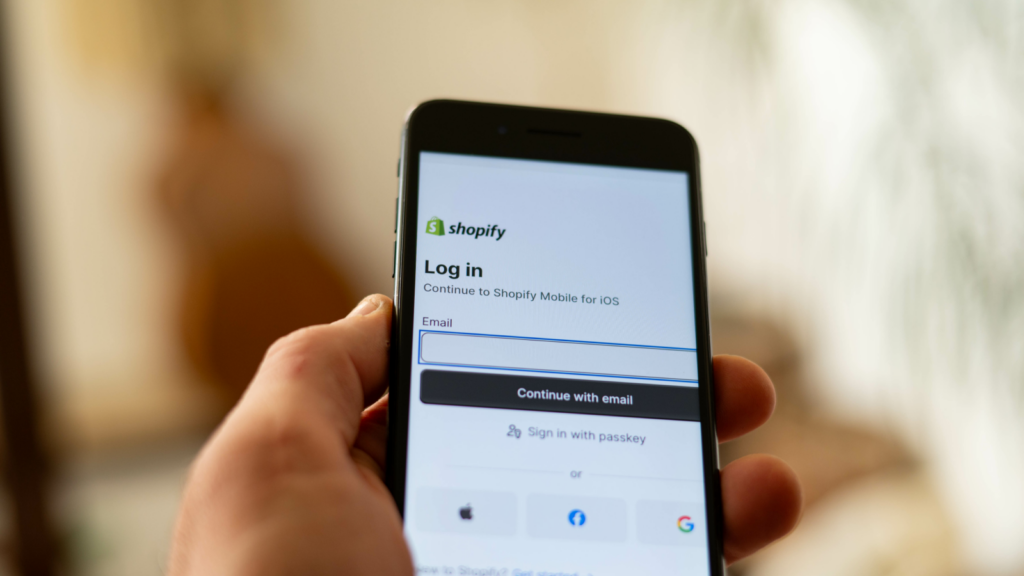Printify + your favorite platform = more sales!
As a Shopify store owner, you know how powerful this platform is for building, managing, and growing your online business – unlock its full potential by choosing the right Shopify apps.
With thousands available in the Shopify App Store, finding the best can feel overwhelming.
That’s why we’ve curated the 28 top Shopify apps for 2026 to help you increase sales, enhance customer engagement, and scale your eCommerce brand.
Overview of the best Shopify apps
| CATEGORY | APP | BEST FOR | MAIN FEATURE | PRICING |
|---|---|---|---|---|
| Sales and conversion | Privy | Lead generation and pop-ups | Customizable pop-up templates | Free and paid plans |
| OptiMonk | Exit-intent pop-ups | Advanced targeting | Free and paid plans | |
| Marketing and social media | Omnisend | Multichannel marketing campaigns | Customizable email templates | Free trial and paid plans |
| Klaviyo | Email and SMS marketing | Automated workflows | Free trial and paid plans | |
| Customer service | Gorgias | Customer support automation | Integrated with social media | Free trial and paid plans |
| Tidio | Live chat with chatbots | AI-driven customer service | Free and paid plans | |
| Shipping and fulfillment | ShipStation | Shipping management | Multi-carrier shipping | Free trial and paid plans |
| AfterShip | Order tracking | Branded tracking pages | Free and paid plans | |
| Inventory and order management | Stocky | Inventory tracking for store owners | Real-time inventory insights | Free for POS pro users |
| Katana | Manufacturing inventory management | Production planning tools | Paid plans | |
| SEO and analytics | Plug In SEO | SEO optimization for Shopify store owners | Automated SEO checks | Free and paid plans |
| Google Analytics | Data tracking and analytics | Real-time insights | Free | |
| Customer retention and loyalty | Smile.io | Loyalty program creation | Customizable rewards | Free and paid plans |
| Yotpo | Customer reviews and visual marketing | Video review feature | Free and paid plans | |
| Product customization | Infinite Options | Product customization | Unlimited product variants | Paid plans |
| Pricing optimization | Bold Pricing | Dynamic pricing options | Volume-based pricing | Free trial and paid plans |
| Store design and page builder | PageFly | Drag-and-drop page builder | User-friendly templates | Free and paid plans |
| Shogun | Customizable landing pages | Drag-and-drop editor | Free trial and paid plans | |
| Advertising and campaigns | AdRoll | Retargeting campaigns | Cross-platform ad placement | Free trial and paid plans |
| Facebook Ads | Social media ads | Broad audience reach | Paid per ad spend | |
| Customer engagement | Loox | Visual customer reviews | Photo and video review functionality | Paid plans |
| PushOwl | Push notifications for store visitors | Abandoned cart reminders | Free and paid plans | |
| Conversion rate optimization | Justuno | Pop-ups, banners, and more | Advanced targeting rules | Free and paid plans |
| Fera.ai | Social proof and product reviews | Real-time customer actions | Free trial and paid plans | |
| Payment and checkout | PayWhirl | Subscription payments | Recurring billing feature | Free trial and paid plans |
| Store analytics | Lucky Orange | Visitor behavior analytics | Heatmaps and session recording | Free trial and paid plans |
| Multilingual support | Weglot | Store translation for international customers | Easy multilingual setup | Free trial and paid plans |
| Abandoned cart recovery | ReConvert | Post-purchase and abandoned cart upsells | Custom thank you pages | Free and paid plans |
Why Shopify apps are essential for store success

Shopify applications are designed to help Shopify store owners optimize every aspect of their business. Here’s why these apps are must-haves for your eCommerce store in 2026:
1. Customize your store’s capabilities
Every store owner has unique needs, and Shopify apps offer tailored solutions to customize your store’s functionality and appearance.
Whether you want to add a user-friendly page builder or a loyalty program to reward customers, specific Shopify apps let you do so seamlessly.
2. Save time through automation
Shopify applications automate repetitive tasks, letting you focus on strategic activities that grow your business.
Apps like PushOwl for push notifications and SMS marketing tools help you consistently engage with your customers automatically, making it easier to drive conversions efficiently.
3. Improve customer engagement and retention
Tools like live chat apps and customer review platforms help keep customers engaged, address their questions, and collect video reviews.
Additionally, integrating email or SMS marketing apps allows store owners to communicate with their existing customer base, conduct post-purchase surveys, and promote repeat purchases.
4. Increase sales with conversion optimization
From pop-up ads and smart shopping campaigns to upselling and cross-selling tools, these apps help you drive conversions, raise your average order value, and reduce cart abandonment.
Apps like Justuno can help with conversion rate optimization, while ReConvert focuses on post-purchase upsells to maximize customer lifetime value.
5. Gain insights through advanced analytics
Shopify has all the tools to help you track customer behavior, monitor business analytics, and investigate their ad spending effectively.
Apps like Lucky Orange and Google Analytics enable you to make data-driven decisions to improve customer engagement, store performance, and attract more customers.
Now, let’s dive into our curated list of the top apps for 2026. Whether you’re just getting started or want to expand internationally, we’ll help you find the best Shopify app for your store.
The 28 best Shopify apps for 2026

1. Privy
Privy is a popular Shopify app for creating pop-ups and email marketing campaigns.
- Key features:
- Customizable pop-up templates
- Email and SMS marketing integration
- Cart abandonment notifications
- Best for: Lead generation and increasing client engagement.
- Pricing: Free plan available; paid plans start at $15/month.
2. OptiMonk
This app specializes in exit intent pop-ups to help retain visitors and recover abandoned carts.
- Key features:
- Advanced targeting and segmentation
- A/B testing for optimized pop-ups
- Integrations with email apps
- Best for: Reducing cart abandonment and converting customers.
- Pricing: Free, paid plans start at $29/month.
3. Omnisend
Omnisend allows for multichannel marketing campaigns, combining email, SMS, and push notifications.
- Key features:
- Easy-to-use email and SMS editor
- Segmentation and targeting tools
- Automated features like cart recovery, re-engagement, and welcome messages
- Best for: Engaging with customers through multichannel marketing.
- Pricing: Try for free; paid plans start at $16/month.
4. Klaviyo
Klaviyo offers powerful email and SMS marketing tools, helping merchants build lasting relationships with their loyal customers.
- Key features:
- Automated workflows and targeted messaging
- Personalization features based on customer data
- Integration with various Shopify tools
- Best for: Building loyal customers through email marketing and SMS campaigns.
- Pricing: Free plan for up to 250 profiles; paid plans start at $20/month for email only and $35/month for email + SMS.
5. Gorgias
Gorgias integrates with social channels, enabling customer service automation directly from your Shopify dashboard.
- Key features:
- Centralized customer support platform
- Social media and email integration
- Automated responses and ticket management
- Best for: Increasing client engagement through efficient support.
- Pricing: Free trial; paid plans start at$10/month, with additional costs based on ticket volume.
6. Tidio
Tidio is a live chat app with AI-driven customer support, designed to engage and assist your customers in real time.
- Key features:
- Live chat with a customizable chatbot
- Integration with email marketing and customer data tracking
- Analytics to monitor chat performance and customer interactions
- Automated workflows to streamline customer service tasks
- Best for: Real-time client engagement and support.
- Pricing: Free plan available; paid plans start at $18/month.
7. ShipStation
ShipStation streamlines shipping management, integrating multiple carriers for faster fulfillment and offering automation features for efficient order processing.
- Key features:
- Support for multiple carriers
- Batch printing and custom shipping labels
- Branded tracking page
- Automation tools for workflow management
- Best for: Simplifying shipping and fulfillment across multiple channels.
- Pricing: Free trial available; paid plans start at $9/month.
8. AfterShip
AfterShip is an order-tracking Shopify app with branded tracking pages and proactive delivery updates.
- Key features:
- Branded tracking pages
- Delivery notifications
- Integration with over 1,200 carriers
- Product recommendations included in higher plans
- Best for: Improving customer experience with detailed tracking and post-purchase engagement.
- Pricing: Free plan available; paid plans start at $9/month.
9. Stocky
The Stocky Shopify app offers advanced stock management tools for Shopify POS users.
- Key features:
- Real-time inventory tracking
- Demand forecasting and analytics
- Supplier management
- Best for: Managing inventory and keeping products in stock.
- Pricing: Free for POS Pro users; otherwise, $89/month.
10. Katana
Katana is designed for stores with manufacturing needs, helping streamline production planning and inventory tracking.
- Key features:
- Real-time production tracking
- Order fulfillment and stock management
- Integrations with accounting tools
- Best for: Small to medium-sized businesses with custom manufacturing processes or complex production needs.
- Pricing: Paid plans start at $99/month.
11. Plug-in SEO
This tool helps Shopify store owners enhance their stores’ search engine optimization.
- Key features:
- SEO audits and insights
- Real-time SEO suggestions
- Automated SEO updates
- Best for: Improving SEO and search visibility.
- Pricing: Free plan available; paid plans start at $29.99/month.
12. Google Analytics
Google Analytics is essential for tracking visitor behavior and measuring the impact of marketing efforts.
- Key features:
- Real-time data and analytics
- Integration with eCommerce platforms
- Customizable reports
- Best for: Gaining insights into website visitors and behavior.
- Pricing: Free.
13. Smile.io
Smile.io allows you to create loyalty programs that encourage customers to keep coming back.
- Key features:
- Customizable reward programs
- Integrations with email marketing tools like Klaviyo
- Points, VIP, and referral program options
- Redeem points for free shipping and products
- Best for: Strengthening customer loyalty and retention.
- Pricing: Free plan available; paid plans start at $49/month.
14. Yotpo
Yotpo provides tools to display customer reviews and increase social proof.
- Key features:
- Review collection and display
- Visual user-generated content (photos and videos)
- Integrations with Google, Instagram, and Facebook
- Video review support
- Best for: Displaying customer reviews to encourage purchases.
- Pricing: Free plan available; paid plans start at $15/month.
15. Infinite Options
Perfect for stores that require customizations, Infinite Options enables product personalization.
- Key features:
- Unlimited product variants
- Custom fields for products
- Swatches, text inputs, and more
- Best for: Product customization and personalization.
- Pricing: Free plan available; paid plans start at $9.99/month.
16. Bold Pricing
Bold Pricing allows you to create custom pricing strategies, including volume discounts and tiered pricing.
- Key features:
- Dynamic pricing adjustments
- Volume-based pricing
- Integrations with other apps
- Best for: Flexible pricing options to increase average order value.
- Pricing: Free trial available; paid plans start at $19.99/month.
17. PageFly
PageFly is a drag-and-drop page builder for customizing your store’s layout without coding.
- Key features:
- Customizable landing page templates
- Drag-and-drop interface
- Mobile optimization
- Best for: Building custom store pages and layouts.
- Pricing: Free; paid plans start at $24/month.
18. Shogun
Shogun offers a page builder with advanced features for larger stores and teams, focusing on high-quality design and customization options.
- Key features:
- Landing page templates
- Drag-and-drop functionality
- Mobile-friendly layouts
- Best for: Creating high-conversion landing pages.
- Pricing: Free trial available; paid plans start at $39/month.
19. AdRoll
AdRoll helps with retargeting campaigns, allowing merchants to reach potential customers across platforms.
- Key features:
- Cross-platform ad campaigns
- Retargeting options
- Ad insights and analytics
- Best for: Retargeting to increase conversions.
- Pricing: Free trial available; paid plans start at $40/month plus ad spend.
20. Facebook Ads
The Facebook Ads integration with Shopify allows merchants to create ads across Facebook and Instagram directly from their Shopify dashboard, offering seamless ad creation, audience targeting, and performance analytics.
- Key features:
- Simple ad creation interface
- Broad audience reach on social media
- Budget flexibility and control
- Best for: Social media advertising on Facebook and Instagram.
- Pricing: Paid per ad spend.
21. Loox
Loox helps showcase visual customer reviews, including photo and video reviews, to build trust.
- Key features:
- Visual reviews with photos and videos
- Customizable review widgets
- Email reminders for reviews
- Best for: Visual social proof to increase conversions.
- Pricing: Paid plans start at $9.99/month.
22. PushOwl
PushOwl sends push notifications to store visitors – perfect for abandoned cart reminders.
- Key features:
- Automated push notifications
- Cart recovery campaigns
- Customizable templates
- Best for: Engaging customers through automated messages.
- Pricing: Free plan available; paid plans from $19/month.
23. Justuno
Justuno offers pop-ups, banners, and promotional tools to help increase conversions.
- Key features:
- Advanced targeting rules
- A/B testing for campaigns
- Cart abandonment recovery
- Best for: Conversion optimization and growing sales.
- Pricing: Free plan available; paid plans start at $59/month.
24. Fera
Fera enables you to increase credibility by showing social proof through real-time customer actions, such as purchases and views.
- Key features:
- Real-time social proof notifications
- Customizable review widgets
- Seamless integration with Shopify themes
- Best for: Building trust and increasing user engagement.
- Pricing: Free trial available; paid plans start at $9/month.
25. PayWhirl
PayWhirl simplifies the setup of subscription payments, ideal for stores offering recurring billing options.
- Key features:
- Flexible subscription options
- Recurring billing and subscription management
- Customer self-management
- Best for: Offering subscription-based products or services.
- Pricing: Free trial available; paid plans start at $9/month.
26. Lucky Orange
Lucky Orange provides in-depth analytics by recording visitor behavior and generating heatmaps for user insights.
- Key features:
- Visitor session recordings
- Real-time analytics and heatmaps
- Polls and surveys to collect feedback
- Best for: Gaining insights on store visitor behavior and improving UX.
- Pricing: Free trial available; paid plans start at $19/month.
27. Weglot
Weglot allows store owners to translate their Shopify stores to accommodate international customers.
- Key features:
- Simple, user-friendly translation interface
- Supports multiple languages
- Automatic language redirection
- Best for: Reaching a global audience with multilingual support.
- Pricing: Free trial available; paid plans start at $17/month.
28. ReConvert
ReConvert helps recover abandoned carts and increase average order value with post-purchase upsells and custom thank-you pages.
- Key features:
- Custom thank-you page design
- Upsell and cross-sell options
- Customer survey integration
- Best for: Maximizing value through post-purchase engagement.
- Pricing: Free plan available; paid plans start at $4.99/month.
How to evaluate Shopify apps and their reviews

Here are some key criteria to help you pick the right Shopify app:
- Review the app description: Understand its features, functionalities, and how it can address your business needs.
- Check customer reviews: Gain insights from other users’ experiences to assess the app’s performance and reliability.
- Evaluate customer support: Ensure the app provider offers responsive and effective support for any issues that may arise.
The right Shopify app can make a meaningful difference, so take the time to find one that’s truly aligned with your business goals.
How to install a Shopify app and get the most out of it

Adding a new Shopify app to your store is a piece of cake. However, some practices can help you make the most of each app after installation.
Step-by-step guide to installing a Shopify app
- Go to Shopify app store: In the Shopify App Store, use the search bar to find the app you want to install or browse through categories like sales optimization or customer engagement.
- Choose your app and click Add App: Select the app that meets your needs and click its listing to learn more. When ready, click Add App.
- Authorize the app: You’ll be directed to an authorization screen where Shopify will ask for your permission to install the app. When you’re comfortable with the permissions, click Install App to continue.
- Configure app settings: After installation, you’ll be redirected to the app’s dashboard or setup page. Here, you can customize the settings according to your store’s needs. For example, push notification apps like PushOwl may prompt you to set up abandoned cart notifications, while email marketing apps like Klaviyo will guide you through connecting to your email list.
- Test the app’s functionality: Before fully launching all of the app’s features, test it to ensure everything works as expected. For example, if it’s a Shopify app designed to display customer reviews, try adding a test review to see how it appears on your product pages.
Setup and configuration tips
Here are some tips to get the most from your apps:
- Customize visual elements: If your app includes visual components such as pop-ups or banners, ensure they match your store’s branding. Use colors, fonts, and images that are consistent with your overall design to provide visitors with a seamless experience.
- Segment customers for targeted campaigns: Apps like Klaviyo and Omnisend allow you to segment customers based on their purchase history, behavior, and preferences. Use segmentation to create more personalized campaigns, increasing conversion rates and customer loyalty.
- Enable analytics and tracking: Many apps, particularly those focused on conversion rate optimization or user engagement, provide analytics for tracking performance. Enabling these metrics will help you understand how the Shopify app is contributing to your store’s objectives, such as increasing average order value or encouraging repeat purchases.
- Automate repetitive tasks: Use automation features when available. For example, use email apps to send automated follow-ups or set up automated messages to remind customers about abandoned carts. Automation saves time and ensures consistent customer outreach.
Maximizing app effectiveness for your Shopify store
After installation, ongoing management of your apps can help you extract the most value. Here are some best practices:
- Regularly review app performance: If an app isn’t performing as expected or is slowing down your store, consider optimizing its settings or replacing it with a different option.
- Stay up to date on new features: Many Shopify applications are updated with new features that allow you to get even more out of the app. Most Shopify app developers send update notifications.
- Limit the number of apps installed: Keep in mind that each Shopify app can impact your store’s loading speed. Focus on apps that directly support your objectives, such as increasing customer loyalty, improving store analytics, or SEO optimization.
- Seek help from customer support: If you have any problems, don’t hesitate to contact the app’s support team. Many apps offer responsive customer support via chat, email, or phone. Timely help can prevent issues from impacting the customer experience of your online store.
Key benefits of using Shopify apps in 2026
Here are some of the key benefits of using these apps and how they can help your online business succeed:
1. Automation of routine tasks
One of the most significant benefits is automating repetitive tasks, freeing your time for more strategic work.
Automating tasks improves customer retention and ensures every visitor receives timely and relevant communication, increasing conversion rates without manual effort.
2. Higher customer engagement
With live chat apps like Tidio and customer review features from Yotpo and Loox, interact with visitors in real time, provide instant support, and collect reviews to build trust.
Push notifications from PushOwl and SMS marketing applications such as Omnisend can reach customers directly, allowing you to maintain a connection and encourage return visits.
3. Increased sales and conversions
Many Shopify apps, from pop-ups to upsells, are specifically designed to improve sales. Apps like Justuno and OptiMonk use pop-ups and banners to capture leads and prevent cart abandonment, while ReConvert offers post-purchase upsells to increase the average order.
4. Improved customer satisfaction
Customer satisfaction heavily depends on a seamless shopping experience. Shopify applications such as Weglot enable you to cater to international customers by translating your store into multiple languages, whereas AfterShip allows you to provide order tracking, which reduces support calls.
Apps like Smile.io offer rewards and loyalty programs that create a positive shopping experience and encourage customers to return.
5. Data-driven decision making
Google Analytics and Lucky Orange provide valuable insights into store visitor behavior, ad spending, and conversion metrics, which are critical for refining marketing strategies and improving store analytics.
With real-time data, make more informed decisions to improve SEO optimization, effectively target potential customers, and cut costs.
6. Scalability and flexibility
Shopify apps allow eCommerce brands to scale and adapt as they grow. Whether you need advanced stock management tools like Stocky or pricing optimization solutions like Bold Pricing, Shopify’s app ecosystem has options to help you meet growing demand without sacrificing performance.
As your business grows, these apps allow you to expand and explore new sales channels, whether through a mobile app or shopping campaigns.
FAQ
Yes, most Shopify apps are designed to work together, allowing you to customize your store’s setup according to your needs. However, using too many apps can slow down your store’s loading speed and impact customer happiness.
Focus on apps that serve essential functions, such as SEO optimization, inventory management, and client engagement, and periodically review your apps to ensure they’re still meeting your business needs.
For beginners, we recommend starting with essential apps that improve store functionality without overwhelming your setup. Apps like PageFly for easy page creation, Klaviyo for email marketing, and Plug-In SEO for SEO optimization are excellent starting points.
These apps help you lay a solid foundation and become acquainted with eCommerce platforms before moving on to more specialized options.
Some of the best apps for increasing sales are ReConvert for post-purchase upsells, Justuno for conversion optimization with pop-ups, and Loox for visual customer reviews.
These apps are designed to engage customers and guide them toward completing a purchase, helping you maximize store revenue and retention.
To uninstall a Shopify app, navigate to your Shopify Admin dashboard, select Apps, and then click Delete next to the app you want to remove.
Keep in mind that uninstalling may not remove all app-related data, so check the app’s documentation or contact support for more information on a clean uninstall if necessary.
Yes, many Shopify apps, available at the Shopify app store, include mobile-friendly features or are available as mobile apps. PushOwl, for example, allows you to send automated mobile messages to customers, whereas Tidio enables live chat via mobile.
Mobile-focused apps can improve the client experience for visitors who use smartphones or tablets, which is especially important given the popularity of mobile or Google shopping.
Some apps, such as Plug-In SEO and Google Analytics, are specifically designed to boost SEO. However, avoid apps that add excessive code to your website, as this can slow down loading times and potentially harm SEO.
Regularly check your store’s performance and consider removing apps that may be impacting load speed.
Gorgias and Tidio are excellent apps for Shopify online store owners looking to increase customer satisfaction. These live chat and customer support apps allow for real-time engagement, making it easier to assist customers and respond to their questions quickly.
Providing efficient customer support can significantly improve the user experience and foster trust with your target audience.
Final thoughts on the best Shopify apps 2025
Shopify apps provide many advantages to online business owners. The right apps can unlock powerful growth opportunities for your online store by automating routine tasks, improving customer engagement, increasing sales, and optimizing analytics.
Selecting the best Shopify apps for your store can make all the difference in delivering a seamless shopping experience, increasing customer satisfaction, and helping you achieve your goals faster.
Remember, building a successful online store is a journey, and these apps can be your trusted partners along the way.












